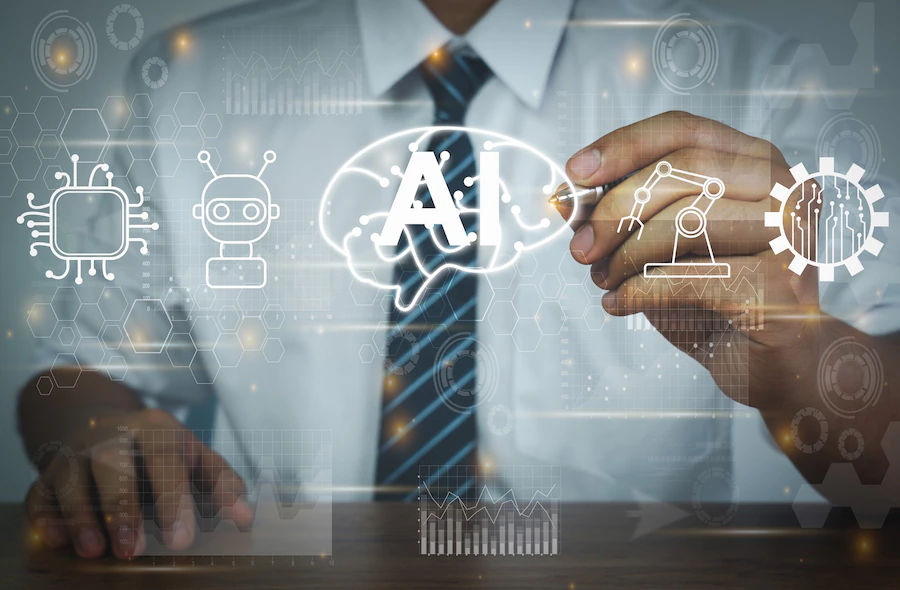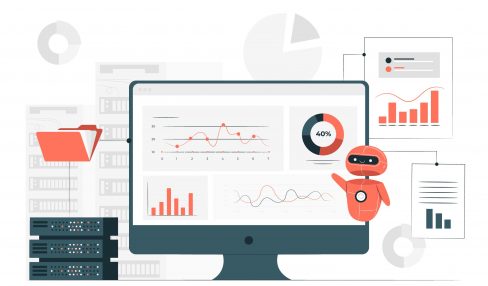5 Ways Businesses Can Harness The Power Of AI And Machine Learning
4 Mins Read
Published on: 14 September 2023
Last Updated on: 13 November 2024

toc impalement
Artificial Intelligence (AI) and Machine Learning (ML) are crucial technologies in modern business, revolutionizing operations by automating complex tasks and enhancing decision-making.
Successful integration allows businesses to adapt to changing markets, drive innovation, and much more.
Here’s our list of 5 ways businesses can harness the power of AI and machine learning.
Competitive Advantage And Innovation

The increase in machine learning vs. AI jobs has only increased due to the rapid improvement and inclusion of both of them in businesses.
Businesses can extract useful insights, automate procedures, improve customer experiences, and reach decisions more quickly than ever by utilizing AI and ML.
AI and ML can enhance businesses by promoting innovation and providing a competitive edge. These technologies enable data-driven decision-making, allowing businesses to mine vast amounts of data for valuable insights.
This leads to more precise market projections, personalized customer experiences, and efficient operations.
AI-powered automation reduces manual work, improving productivity and allowing employees to focus on higher-value activities. AI algorithms can also identify patterns and trends, aiding in product development and enhancement.
For example, industries and businesses making use of AI document management benefit from its implementation, including computerized sorting and automated grouping of documents.
By leveraging AI and ML, businesses can quickly adapt to market changes, ensuring long-term success.
Improving Personalization
Businesses are discovering new methods to engage with their consumers and offer a more individualized experience as the world gets more digital.
The application of AI and ML to create individualized consumer experiences is a fascinating development in this field.
Numerous client data points, including browsing and shopping histories, social media activities, and demographic data, are gathered and analyzed as part of AI-powered personalization.
Each customer’s unique wants and preferences are discovered using this information.
AI-powered personalization may greatly increase customer happiness and loyalty by adjusting the customer experience to each person’s tastes and demands. Customers feel valued and understood thanks to the tailored experience, which could lead to more engagement.
Businesses may improve the possibility that a client will make a purchase and enhance total revenue by suggesting goods and deals that are highly relevant to each particular customer.
AI-powered personalization can lower customer turnover rates by offering tailored experiences that cater to each client’s demands. Customers are more inclined to stick with a brand that knows their preferences and offers a tailored service.
It also offers insightful data on each customer’s interests and activity. Utilizing this information, businesses may enhance their marketing tactics by better understanding their target audiences.
Fraud Detection And Prevention
AI-powered machine learning algorithms use millions of data points to detect and prevent fraud, making it the most relevant method for companies.
These models can identify unique risks and automate fraud decision-making, providing immediate suggestions without affecting loyal customers.
As fraud is a constantly evolving issue, AI is well-suited for detection as it can quickly recognize new trends and act before losses occur.
Without AI, businesses may not be aware of new fraud trends for weeks, causing severe harm until regulations are adjusted. ML fraud models are faster and more accurate than conventional techniques in detecting new trends.
By continuously tracking transactions and detecting abnormalities in the training data set, ML models adapt to shifting fraud tendencies. This enables the development of modern rules that prohibit related transactions or mark them for human inspection.
Employee Productivity And Collaboration
AI and ML have revolutionized employee productivity and cooperation in various professional settings.
These tools automate routine tasks, offer predictive analytics, and provide personalized suggestions. They optimize processes and resource allocation by analyzing vast amounts of data.
AI-driven communication solutions encourage real-time conversations and seamless cooperation, eliminating distance barriers.
Virtual assistants and chatbots make information more accessible and save time.
The integration of AI and ML enhances individual productivity and fosters innovation and teamwork within firms, enabling them to succeed in the fast-paced commercial environment.
Predictive Maintenance And Efficiency
By employing data analysis and AI to predict and avoid problems, minimize downtime, and improve performance, predictive maintenance takes a proactive approach to maintaining buildings and equipment in top working order.
Facilities engineering may benefit from using AI for predictive maintenance in various ways, such as improving asset availability and dependability by preventing failures, delays, and interruptions.
By reducing human error, accidents, and flaws, it may also increase safety and quality. AI may also contribute to cost and resource savings by enhancing maintenance schedules, decreasing waste, and extending equipment lifespan.
Additionally, it may improve production, output efficiency, and customer happiness, all of which can increase productivity and performance.
Finally, by enabling data-driven decision-making, ongoing improvement, and environmental compliance, AI may help innovation and sustainability.
Conclusion
Businesses are being transformed by AI and ML because they enable data-driven decision-making, improve tailored consumer experiences, and enhance fraud detection.
These innovations promote long-term success by enabling quick market adaptability.
AI-driven solutions also increase worker output and teamwork, fostering an efficient workplace atmosphere. Last but not least, AI-powered predictive maintenance aims to boost safety, dependability, and cost efficiency.
As AI develops, its potential for efficiency and creativity across several industries is limitless, setting the path for a future of AI where businesses flourish in a digital environment.
Read Also:


















Comments Are Closed For This Article